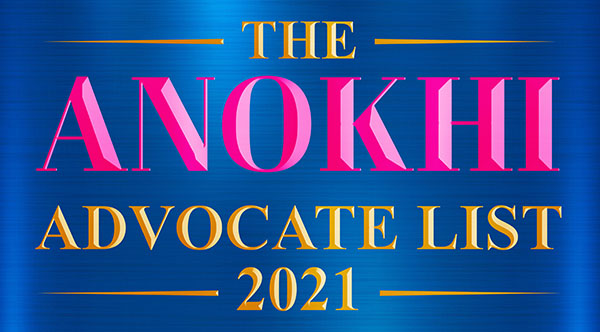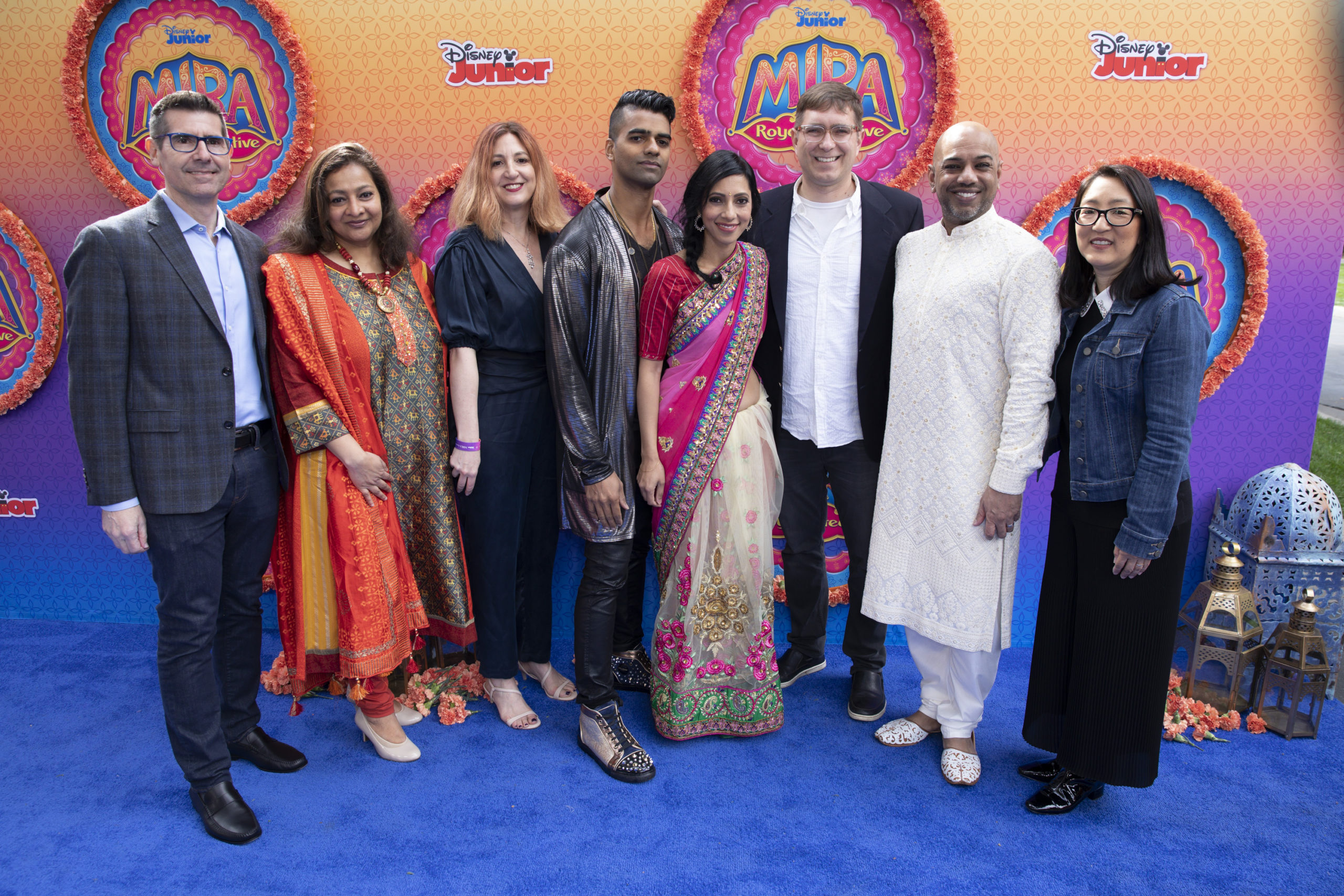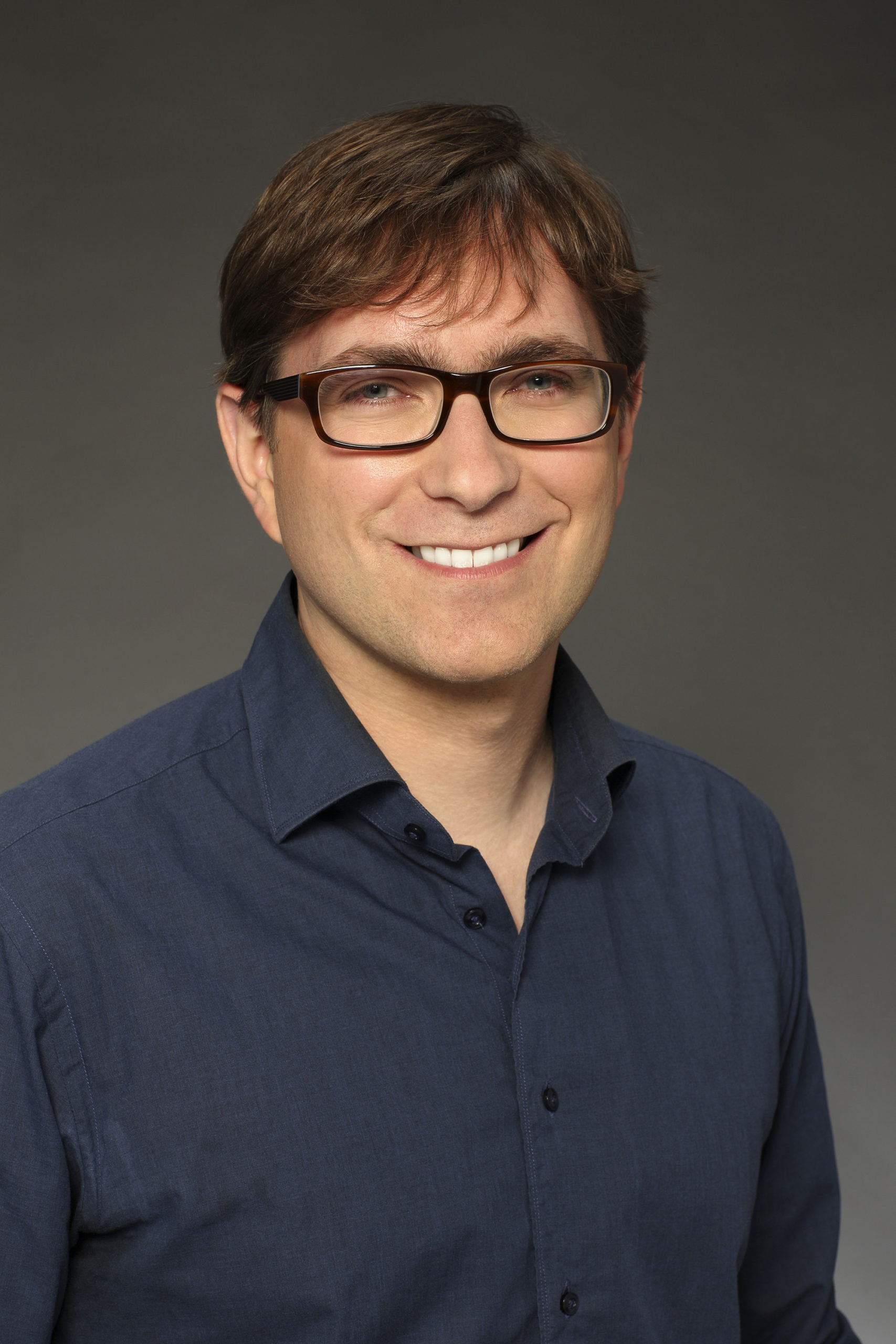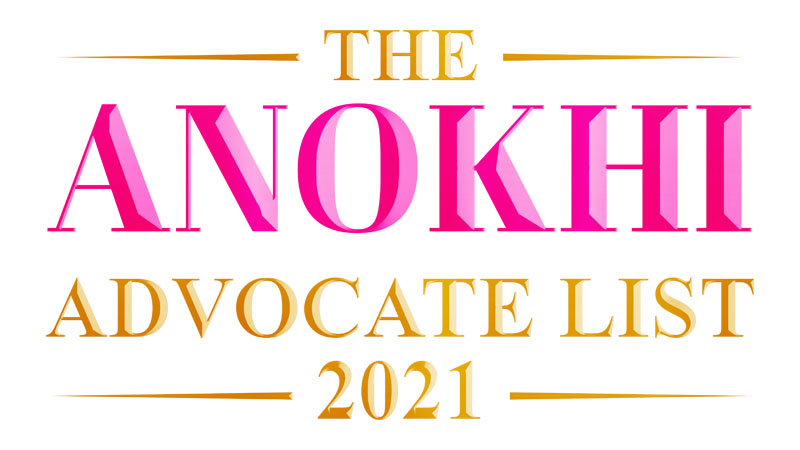Emmy®-nominated writer and producer Sascha Paladino is the executive producer of Disney Junior’s animated series “Mira, Royal Detective,” which follows Mira, a young girl who travels throughout the magical Indian-inspired land of Jalpur solving mysteries for her friends, family and extended community.
An accomplished children’s television writer, Paladino was most recently creator and executive producer of Disney Junior’s acclaimed STEAM-focused animated series Miles from Tomorrowland and its subsequent iteration, Mission Force One. The series made history as the first children’s program to have an episode premiere in outer space aboard the International Space Station. He was story editor and consulting producer on Disney Junior’s Henry Hugglemonster and developed and served as head writer and producer for Ni Hao, Kai-lan.
Hina P. Ansari: Welcome to The ANOKHI Uncensored Show. I’m Hina Ansari, and we are thrilled to have Sascha Paladino who is the Executive Producer for Disney’s Mira, Royal Detective. Thank you, Sascha, for agreeing to be a part of The ANOKHI Advocate List. This is to commemorate our 19th anniversary of an ANOKHI.
Sascha Paladino: Thank you so much. It’s just it’s an honour to be here. It’s an honour to be part of this list and to represent Mira, Royal Detective, which all of us who work on it are so proud of.
HPA: I have to tell you, we are huge fans of the show. As soon as that show came out, all of us just sent links to everybody. All of our nieces and nephews. So we’re thrilled that have a chance to chat with you. As you know, you are part of The Advocate List, so I’m going to start with the very first question. What does advocacy mean to you?
SP: I say to me, advocacy is about using your voice and any power that you might have in your community to raise the issues that you feel are important and find a way to shine a light on them.
HPA: And why is advocacy important to you?
SP: Well, for me advocacy is important because it’s a chance to really tell stories about the things that I think are meaningful. That’s what I know how to do. Tell stories through television for kids and to be able to tell stories I care about about from communities that might not have been represented before or aspects of our culture that might be underseen. To me, that’s advocacy. It comes through in my work as stories and shining a light — like I’ve said — on stories that haven’t been told before or haven’t been told on a big canvas before. That’s one of the great things about working for Disney. We have such a huge reach. For example, Miles From Tomorrowland is on, I think in over a hundred and fifty countries. So it’s really this amazing playground in which to play that we know is being seen all over the world. And that gives us a big responsibility to make sure that we’re getting it right, that we’re doing these stories in a really thoughtful and sensitive way. And it’s also a privilege. It’s a privilege to get to tell stories in this case about South Asian culture.
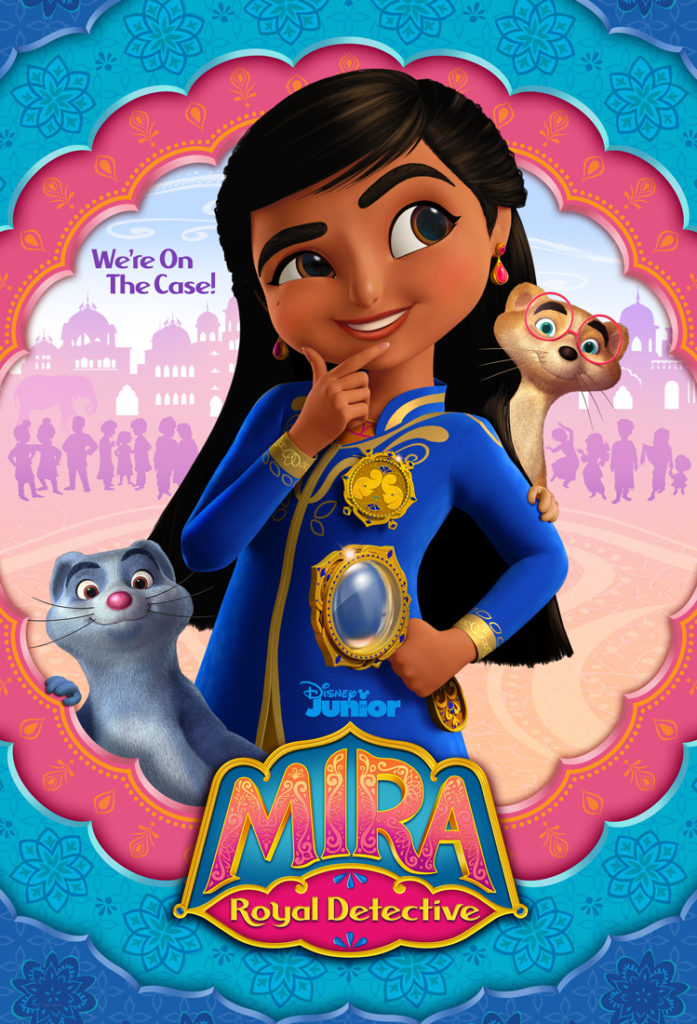
HPA: So now can you share with us your personal advocate philosophy? I know you started telling me a little bit about it just now, but can you expand on that?
SP: For me, advocacy really comes down to storytelling. That’s what I know how to do, and that’s how I like to sort of think about the world. Because I tell stories for kids. I think a lot about how kids understand the world, and so much of that is through the stories that they hear, the movies and TV that they watch. And so those stories are a real opportunity to sort of open their worldview, expand their horizons, kind of literally in the case of their real detective, because we’re for many kids showing them a culture that they haven’t seen before. On the other hand, what we do for kids who are on this show, who are South Asian or South Asian descent, is reflect their culture back at them. TV is a really powerful tool for that, because these stories can have a real impact on kids at a really formative time in their lives. Because telling stories for young kids is what I do, it informs my view of advocacy. And I guess that’s why, to me, advocacy is all about telling stories and telling them well.
HPA: That’s great, so now please tell me, how did the idea of South Asian representation become so important to you at Disney?
SP: I was brought onto the project once it was already sort of in process. Disney was working with an amazing writer named Becca Topol, who had developed the show with them, and they had already all decided on the South Asian element. And when they brought me on, I was really honored because I’ve always loved South Asian culture, I’m a big fan of South Asian music. The previous show that I worked on for Disney Miles From Tomorrowland. We had worked with a studio in India, so I had been to India once on a trip to work on the animation there. I’ve just always been someone who’s interested in doing deep dives and cultures that are not my own. I grew up in New York City, surrounded by just sort of a big mash up of cultures, and it’s always just inspired me being in the midst of a culture that’s not my own.
TV is really powerful tool for that, because these stories can have a real impact on kids at a really formative time in their lives. Because telling stories for young kids is what I do, it informs my view of advocacy.
I was excited to take on this challenge of figuring out how to develop and create a show that honoured and celebrated South Asian culture as someone who’s not South Asian. It was a big kind of thing I had to wrestle with as a white guy coming in. It’s not my culture what gives me the right to bring this show about South Asian culture. So that was something I really had to examine and wrestle with before I made sure I was the right person for this. It’s also a time when a big discussion that’s going on in terms of creative storytelling, like who gets to tell what story? And the reason I did accept the job and throw myself into it was because I landed on this idea that a big part of my job is to step back and listen. It’s not my culture, I know that. I want to be upfront about it with all our writers, everyone, but it’s my responsibility to make sure that we include as many South Asian voices in the process as possible.
So that’s something we’ve really worked hard to do on this show, work with South Asian writers, artists, musicians at every aspect of the production and then contribute what I know how to do, which is tell stories that are appropriate for this age group and help with the story structure, figuring out characters, our curriculum, things like that. But then really take a step back and make sure that the voices that know this culture that are of this culture are the voices that can rise and ring out loud and clear. The only way I think this show could have happened and what I’m really proud of is that it was a true collaboration.
South Asian representation has always been at the forefront of all our conversations about this show. And my job was to make sure that we’re balancing that with just telling amazing stories that any kid can relate to, because story is ultimately the story, hopefully that we’re telling are universal. It’s the details that are specific and representative of the culture. So my job is to sort of weave those two things together.
The reason I did accept the job and throw myself into it was because I landed on this idea that a big part of my job is to step back and listen. It’s not my culture, I know that. I want to be upfront about it with all our writers, and everyone. It’s my responsiblity to make sure that we include as many South Asian voices in the process as possible.
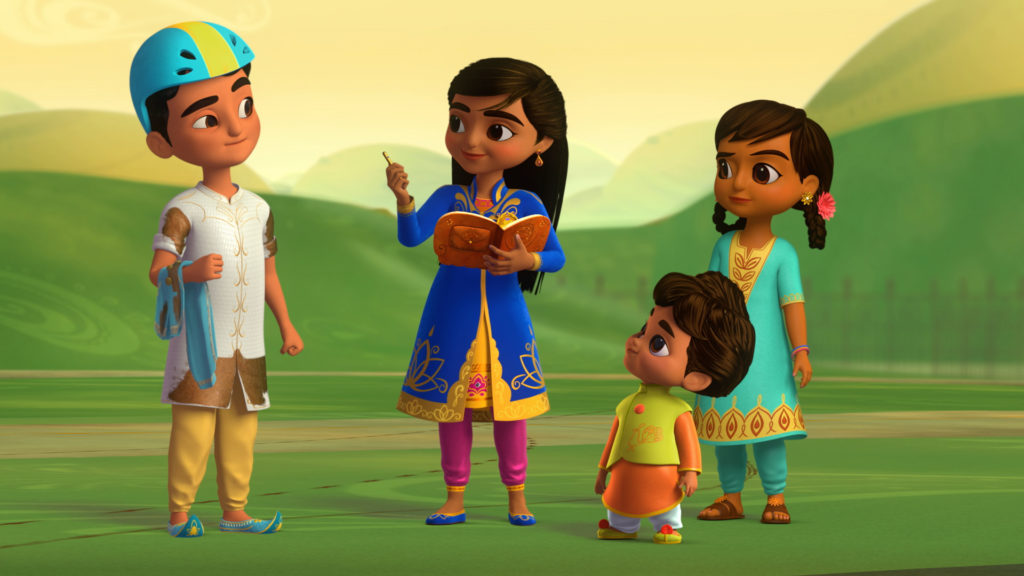
HPA: Can you share with me in our audience why it’s so important for people to incorporate a sense of advocacy into their lives?
SP: I think of it always in terms of kids. Because that’s what I do. I make TV for kids. And like I said, storytelling is the way that I communicate with kids. And seeing how kids interact with Mira on a very personal level is one of the most satisfying things about my job. So, for example, from South Asian families, we’ve gotten amazing tweets and response just saying like “my daughter is so amazed to see someone who looks like her on screen, and she hasn’t seen that before”. “You know, my son has never seen Diwali celebrated on Disney before, and they’re wearing what he wears”. And that, to me highlights the importance of and how personal advocacy can be.
When you think of it in terms of stories, you’re really reflecting this very personal part of someone’s life back at them. And it’s really exciting when people recognize that feel seen. And then on the other side, you’re opening up kids’ eyes who don’t know anything about South Asian culture to these beautiful traditions and musical traditions, food and everything. The colours, we’ve been really inspired by Bollywood movies in the way that this show visually works and the stories that we tell. So hopefully we’re opening his eyes. To who are not South Asian to a new culture to a new kind of storytelling. And you know, again, hopefully that’s something that gets into their personal lives as well. We’re not going to be able to teach everything there is about South Asian culture in this show, but hopefully, you know, it’ll inspire them to want to learn more.
HPA: Now let’s talk about how advocacy has been in the last year. What have you seen that has stood out in how our world is changing to meet people where they’re at rather than trying to have them fit into preconceived ideologies?
SP: Well, I mean, I think it’s a really good time. It seems like things are changing. There’s a lot more representation than there used to be. And it’s exciting to be a part of that. I can only speak from my experience on this show and other things I’ve worked on, but I see an increased interest and excitement about representation. Another example is not this specific show, but I work with a group called the Center for Scholars and Storytellers I’m on the Advisory Council. It’s a group out of UCLA that connects storytellers with academics and kind of the research that’s being done in media and other fields, and this is just one example, but one thing that we advocate for is representation of boys and men in media. There are a lot of stereotypes of how boys and men act. There’s the stereotypical male thing of like, you know, being very quiet, not expressing emotion and things like that. The one thing we’ve really advocated for, which I’m really proud of, is encouraging storytellers and creators to show different sides of what it means to be a boy or a man. We created this tip sheet for writer’s rooms to sort of keep these things in mind when writers are breaking stories and things like, show a boy talking about his feelings. It’s a simple thing, but they can have a big impact. Or, for example, show a kid, a boy, taking care of a baby. We often see females as caregivers, but not as much males. It’s about correcting these imbalances. And what’s exciting about this is that we’ve had so much great feedback on that tip sheet. Tons of different studios downloading this tip sheet and telling us it’s been really useful. That says a lot about this time in advocacy. It says that these things that we advocate for, there’s a need for them and they’re having an impact. So that’s exciting and it’s exciting to be a part of that.
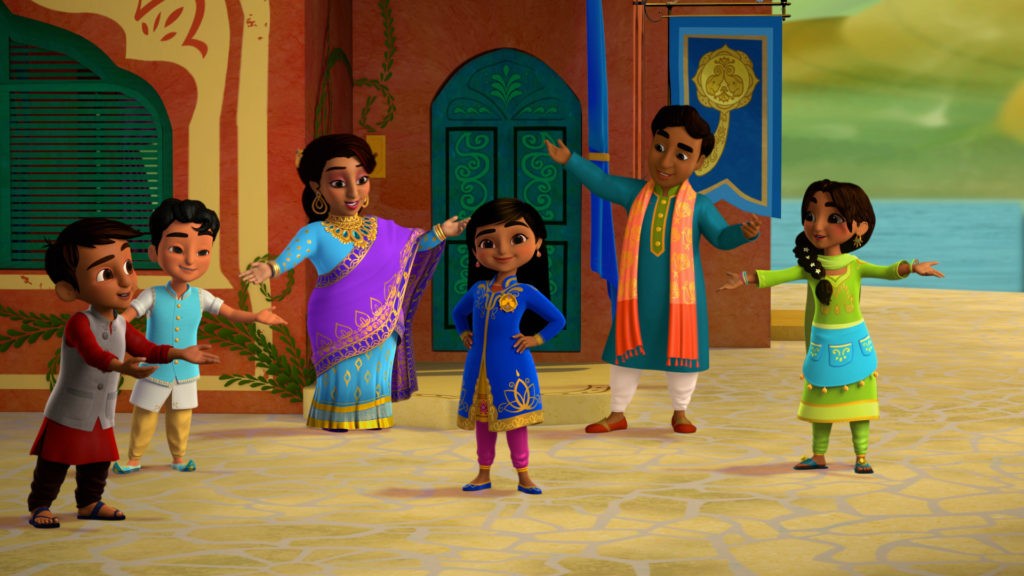
HPA: What challenges have you had to overcome when it comes to voicing your support for a cause that you believe it? I mean, it could be a cause for something that has happened in the world.
SP: In terms of challenges, I guess I feel pretty lucky, and I haven’t really had many challenges. I’ve been really lucky to work with networks and collaborators who are on the same page. For example, the show that I did before was about a family living in outer space. Even though it’s about a family interacting with alien cultures, the idea was really about connecting with cultures that are different from your own. This, as you can see, this is my version of advocacy, [which] is all about culture and connecting cultures, whether real or imagined. And what I felt so lucky about with Disney is that they supported that. They supported the idea that even though these characters are visiting other planets, it’s really a stand-in for visiting other cultures and what that means. And they were very happy to have me explore that in the form of stories that I felt. I guess one of the lucky ones that hasn’t run up against a lot of challenges in that respect. I feel really lucky that the South Asian community has embraced our show. It could have gone either way. I really believe in representing and celebrating South Asian voices and culture. And so the fact that it has been embraced by you guys is really important and meaningful to me.
HPA: You talked about how our South Asian culture has embraced me. But I have to ask you, have you had any resistance from our community when it comes to advocating this cause?
SP: I have to say I really have had [any], it’s been a pleasure. I like to think that we did our due diligence. You know, just in terms of really thinking through the right way to do it. We worked with, as I said, with as many South Asian voices as possible on the show. We work with cultural advisors. We were able to take a trip to India with some members of the crew both to work with our animation studio in Bangalore, but also to take a trip to Rajasthan for research, which is the region that the town in the show is based on. And I just feel so lucky that we’ve been able to do it in what I feel is, the right way, a way that thoughtful, sensitive, really well thought out. And I think, most of all, intentional. We’ve just tried to be intentional every step of the way.
HPA: Now, with all that you’ve seen and experienced, what advice would you give to everyone who’s watching, listening and reading this who want to be more proactive in a cause they believe in and to actually get up and action it?
SP: I’d say it’s about finding your fellow travelers. Finding the people and organizations that have missions and goals that are aligned with your own. We’ve been really lucky with Mira, Royal Detective to be able to work with a number of organizations. For example, SILA Consulting is a Muslim consulting group that we’ve worked with. We did an episode about the holiday of Eid, and that was a really big deal to celebrate a Muslim holiday on a Disney show. And it was very challenging. Also, a group that was also very helpful that shows the Muslim Public Affairs Council. They have a Hollywood Bureau, and they had invited me early on. They had introduced me to some Muslim writers and they had invited me to an Iftaar dinner. And it was such a wonderful celebration. I didn’t know that much about Eid, and I learned so much from that event that I it made me want to figure out a way to do that holiday to celebrate that holiday on Mira. Because obviously, you know, Islam is such a big part of South Asian culture and we want to represent in the show every aspect that we can of the culture. I would just say linking up with an organization like that was really exciting because it made me want to be more proactive in this cause that I already believed in. So I would encourage people who have an interest but aren’t sure what to do to reach out to organizations and groups and even just people who you like what they have to say, like their tweets, whatever it is, you never know what kind of collaboration might come out of it or what kind of inspiration might come out of it.
I would encourage people who have an interest but aren’t sure what to do, to reach out to organizations and groups and even just pople who you like what they have to say, like their tweets, whatever it is, you never know what kind of collaboration might come out of it, or what kind of inspiration might come out of it.
HPA: Thank you, Sascha, for sharing your perspective with our global audience, and congratulations for being part of The ANOKHI Advocate List!
SP: Thank you so much, and I just appreciate everything that you guys do, and being a part of it means a lot to us than the entire Mira crew. So thank you!
